#Moravia
Explore tagged Tumblr posts
Text

Girl in folk dress of the people of Biele Karpaty, a region in the Carpathians between Moravia and Slovakia
75 notes
·
View notes
Text
Rakvice🇨🇿
Some beautiful Moravian dresses/costumes from Rakvice, a village/municipality in the South East of Czechia🇨🇿.
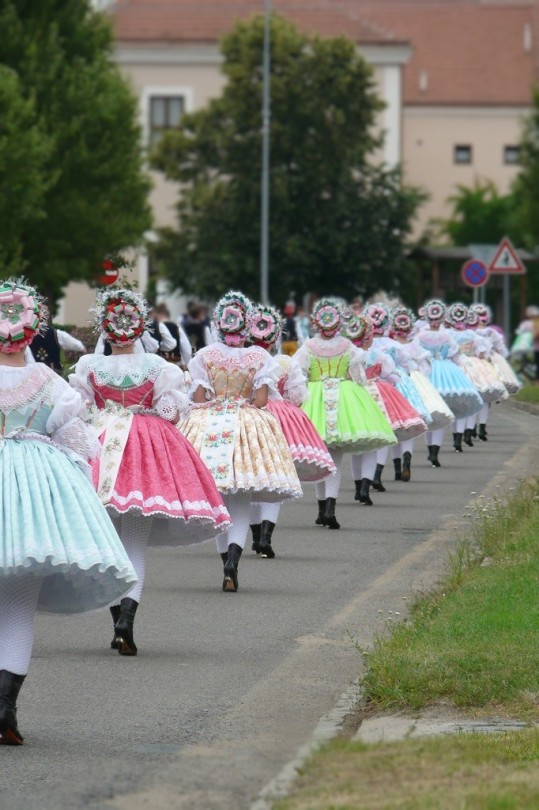

This place has wonderfully preserved their beautiful culture.
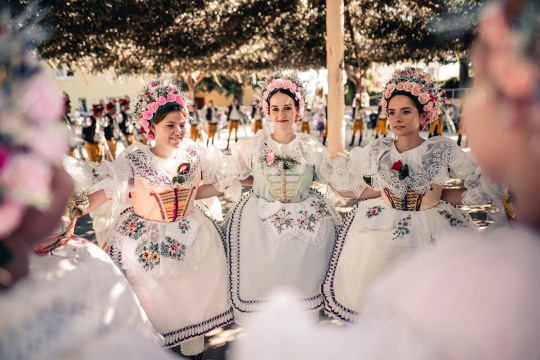
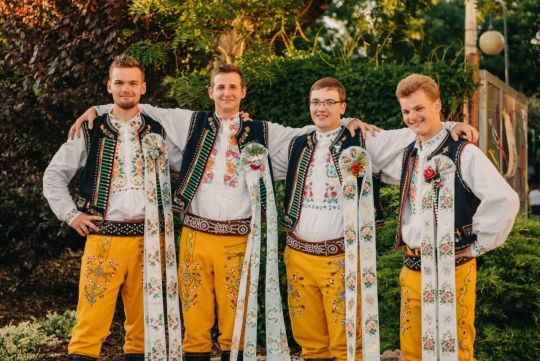
You will notice with Moravian dresses, women tend to have large, puffy dresses with their distinctive huge, wide skirts and abundant petticoats underneath.

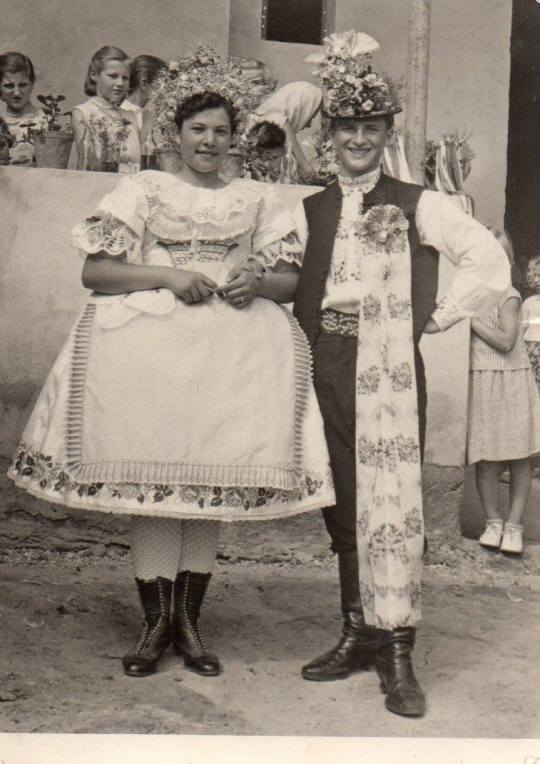
In many regions in South Moravia, men's costumes typically include a long white embellished ribbon with a decorated cockade on the right side of their vests as you can see above.
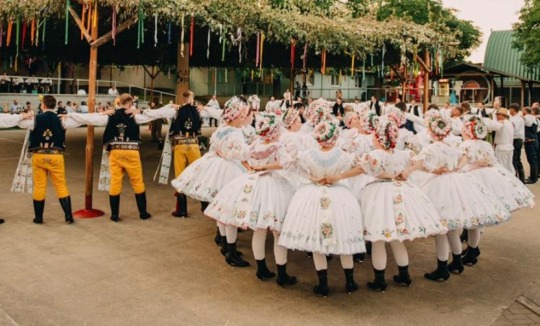
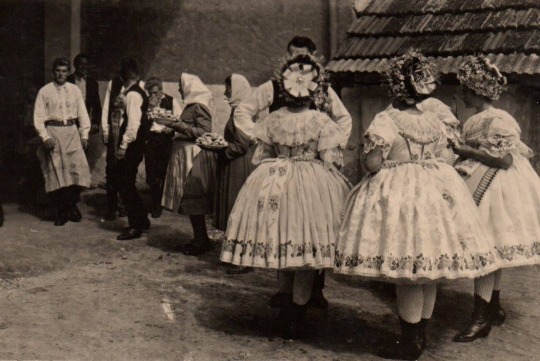
I managed to find some older photos from 1959 too♡

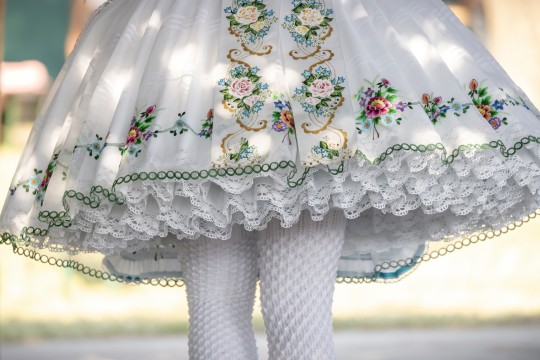
A traditional dress/costume in Czech & Slovak is called a "Kroj" (pronounced like kroi). I love how highly and beautifully embellished each garment is from here♡
#slavic#slavic culture#folk#folklore#slavic tradition#tradition#czech republic#czechia#czech girl#moravia#czech folklore#czech tradition#moravian folklore#morava#moravian tradition#czech traditional dress#moravian dress
416 notes
·
View notes
Text

Podhorácko Miku!
Jumping on the cultural representation bandwagon (must say I had to look her up...) with a quick doodle of one of the least obvious Czech / Moravian folk costumes.
I mean, original idea was Valašsko / Moravian Wallachia (part of my own family heritage) but I feel like that's the second most obvious Czech folk costume artists reach for every time they want to be different and avoid the super-obvious Slovácko... Podhorácko is a rather loosely defined border region between South Moravia and Vysočina / the Highlands, where it seems the folk costume doesn't differ too much from Horácko proper and what sets the region apart is rather geography and dialect.
One thing to bear in mind is that folk costumes were never uniforms, and Podhorácko appears to be one of the regions that underline the individuality. I zoomed in on Tišnov (among other reasons like liking the town, the red and white striped skirts are striking and easy to draw) and stole some elements from an old photo of very low quality which I'm guessing is from the 1890s (based on the non-folk-costumed lady in the back), and even there every single person seems to be wearing something slightly different.
Upon reflection, not sure where I came across the beribboned sleeves because Tišnov it ain't. Ah well. If someone with better artistic skills wants to take her on, please do. Yay for cultural representation. 😀
#hatsune miku trend#hatsune miku#folk costume#traditional dress#czech#czech folklore#all things czech#czechia#moravia#moravian folk costume#podhorácko#moravian#marmota tries to keep drawing#czech republic#cultural representation#cultural heritage#cultural clothing#čumblr#miku worldwide#brazilian miku trend#brazilian miku meme#czech miku
140 notes
·
View notes
Text
2025 Explorations of Czech Calendar Customs (As Used in a Personal Folk Practice)

Consecrating salt in a personal ritual on Zvěstováni Panny Marie/Lady Day/Annunciation of the Virgin Mary
Walnut boat divination

Walnut boat (or in our case hickory nut) divination
Pouring the wax divination
sedm šálků (seven cups) divination
This year I made my vànočka (Christmas bread) on Twelfth Night

Vánočka (braided Christmas bread)
Three Kings Day
Consecrating water on Three King’s Day, January 6
Masopust is kicking off
Annointing this year’s Morana effigy and the Morana embroidery
Morana in her winter apparel

This year’s Morana effigy
An offering to Mezulína
Making Morana Holy Water (my own custom)
Making this year’s hromnička (thunder candle)

This year’s hromnička (thunder candle)
Consecrating this year’s hromnička (Thunder candle)
Eve of Hromnice altar
Making candles for Hromnice (Candlemas) February 2
Perun and Hromnice
“Na Hromnice o hodinu více” = At Hromnice (Candlemas/Groundhog Day or February 2nd) one hour more
Buchty for Saint Blaise’s Day, February 3

The buchty (Czech sweet buns) that I made for Saint Blaise’s Day
Blažeje Blessing, February 3
Caroling on Saint Blaise’s Day, February 3
Saint Blaise’s association with cattle—and Veles
Feast Day of Saint Agatha, February 5

Consecrating water, bread, and salt on Saint Agatha’s Day for use in folk magic.
Happy Feast Day of Saint Dorothea February 6
St. Dorothea Plays February 6
Wrapping up the first week of February (St. Brigid’s Day, Hromnice/Candlemas, St. Blaise Day, St. Agatha Day, and St. Dorothea Day)
Inviting Děduška into our home
Kolàče (I made some for Valentines Day)
A bábovka for my birthday (Feb. 23)
Coaxing Spring with bird pastries
Saint Matthew’s Day Traditions (Folkloric Date — February 24)
Releasing bird buns on St. Matthew’s Day
Waking the persimmon trees on St. Matthew’s Day
Waking the hazelnut and black cherry
Drowning Morana on St. Matthew’s Day
Drowning Morana on St. Matthew’s Day 2
Koblihy (jam filled doughnuts) for Fat Thursday (Feb. 27 this year).
Lišÿí, Fox Sunday,the first Sunday of Lent (this year March 9)
Celebrating Fox Sunday
Saint Gregory Day — storks and plowing (folkloric date March 12)
Blessing the land in St. Gregory’s Day
Unveiling Morana on St. Gregory’s Day
Saint Joseph’s Day (March 19)
Perník Instead of Perníčky for St. Josef’s Day
Dying Eggs on St. Josef’s Day
Líto/litečko
My líto/litečko
Lady Day/Zvěstováni Panny Marie/Annunciation of the Virgin Mary (March 25th)
Lady Day Protection Ritual
St. Josef’s Eggs Pickled on Lady Day
Annunciation Salt
Družebná Neděle, Fourth Sunday of Lent, (this year March 30)
Deadly Sunday (this year April 6th)
Palm Sunday Traditions (this year April 13)
Blue Monday (this year April 14)
Gray or Yellow Tuesday (this year April 15)
Ugly Wednesday (this year, April 16)
Green/Maundy Thursday (this year, April 17)
Great/Good Friday (this year, April 18)
Easter Rattling —Maundy/Green Thursday through Holy/White Saturday (this year April 17 - 19)
White Saturday (this year, April 19)
Easter Sunday (this year, April 20)
Easter/Red Monday (this year April 21)
Saint Vojtěch Day (Czechia’s patron Saint) April 23
Saint George’s Day April 24 (in Czechia, Hungary, and Slovakia
White Sunday (this year April 27)
Burning of the Witches April 30
Fairy Tales:
Božena Němcová, collectors of fairy tales
The Devil and Old Kitty
The Twelve Months
Folk creatures:
Bludička (will o’ wisp)
Čert (Czech folk devil)
Hejkal (Forest demon)
Klekánice (Kneeling Lady, Lady Evening)
Mezulína (a bitter winter and destructive winter wind)

An offering to Mezulína
Plivník (untrustworthy house spirit)
Skřítek (house spirit)
Vodník (water demon)
Other:
Old style wood burning stoves
#czech#moravian#folk magic#calendar customs#folk christianity#folk catholicism#dual faith#west slavic#slavic#Czechia#Moravia#master post
36 notes
·
View notes
Text

Grand-prix Lookout Café in Brno
46 notes
·
View notes
Text

Quick digital study of a painting by Antoš Frolka (probably girls from Ratíškovice)
#digital art#art#traditions#folklore#culture#slavic#slavic culture#traditional costume#artwork#digital aritst#morava#south moravian region#moravia#traditional clothing#antos frolka#czech culture#czech tumblr#czech art#czech republic#czechia#czech#kroj
21 notes
·
View notes
Text

La noia, Moravia
#amore#dolore#frasi#frasi amore#frasi e pensieri#riflessioni#pensieri#citazioni#citazione libro#citazione tumblr#moravia#la noia#desiderio#frasi citazione#citazione amore#citazione vita#frasi belle#frasi profonde#frasi tumblr#libro#leggere#classici
18 notes
·
View notes
Text

Joža Uprka – Úvodnice z Velké.
#Joža Uprka#moravia#czech#slovak#slovakia#czech republic#history#arte#art#painting#artwork#oil painting#paintings#art history#folk#folklore#folk art#rural#rural art#women#women in art
28 notes
·
View notes
Text
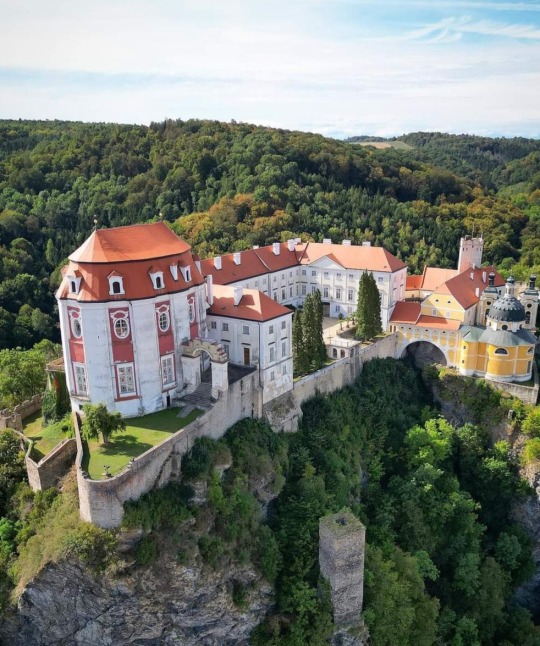
Vranov nad Dyjí Castle - CZECH REPUBLIC
#vranov nad dyji#castle#château#castillo#schloss#moravia#czechia#czech republic#republica checa#europe#europa
94 notes
·
View notes
Text

The Venus of Dolní Věstonice is a Venus figurine of female figure dated to 29,000–25,000 BC. It was found at the Paleolithic site Dolní Věstonice in the Moravian basin south of Brno, in the base of Děvín Mountain in which is present-day Czech Republic.
Source: Ancient Library
#Ancient Library#ancientlibrary.com#The Venus of Dolní Věstonice#Venus figurine#female figure#ancestors alive!#what is remembered lives#memory & spirit of place#ancient ways#sacred ways#life#29000-25000 BC#Paleolithic site Dolni Věstonice#Dolní Věstonice#Moravian basin#Moravia#Brno#Děvín Mountain#Czech Republic#Goddess
37 notes
·
View notes
Text
Ciò che mi colpiva, soprattutto, era che non volevo fare assolutamente niente, pur desiderando ardentemente fare qualche cosa. Qualsiasi cosa volessi fare mi si presentava accoppiata come un fratello siamese al suo fratello, al suo contrario che, parimenti, non volevo fare. Dunque, io sentivo che non volevo vedere gente ma neppure rimanere solo, che non volevo restare in casa ma neppure uscire; che non volevo viaggiare ma neppure continuare a vivere a Roma; che non volevo dipingere ma neppure non dipingere; che non volevo stare sveglio ma neppure dormire; che non volevo fare l'amore ma neppure non farlo; e così via.
7 notes
·
View notes
Text

here is your frgal bbg, very silly moravský duch
#cod mw2#cod#cod ghost#call of duty#simon ghost riley#simon riley#Moravia#morava#silly art#art#digital art#digital illustration#digital drawing#digital artist#artist#frgál#my art
21 notes
·
View notes
Text

When we think of the beautiful aesthetics of the Moravian past, most of us only tend to think of the good. But what untold fantastical darkness may lay under that aesthetic?
We may never know now.
#dorkie's art#art#drawing#small artist#illustration#clip studio paint#digital art#morava#moravia#Kroj#czech#folklore#folk art
14 notes
·
View notes
Text
Saint Matthew’s Day (Folkloric Date — February 24)

Josef Lada
While today's Catholics celebrate the feast of Saint Matthew on May 14, before 1970 they commemorated this additional apostle on February 24. At that time, the Saint Matthew pilgrimages opened a new pilgrimage season and were also one of the harbingers of the coming spring.
In folk tradition, Saint Matthew was associated with the arrival of early spring. In the Chod region and South Moravia, it was said that sparrows had a wedding on this day. Farmers monitored the weather and, using the weather forecast, estimated how long the frosts would last and what the harvest would be that year. In the Beroun region, barley was sown in the morning, at noon and in the evening - the one that emerged the fastest was supposed to be the most suitable for sowing.
One of the widely spread auspicious rituals was also associated with the feast of St. Matthew. Before sunrise, people would go out into orchards and gardens, where they would shake trees, beat them with sticks and wooden spoons, and loudly invoke St. Matthew to protect the trees from frost and ensure a bountiful harvest of fruit. In some areas, adults also participated in these magical acts, but in most of our territory, this important task fell exclusively on the shoulders of children. Children would run around the orchard, barefoot and in thin shirts, or even completely naked, climbing trees, shaking their branches, and singing songs about all the types of fruit they would enjoy in the summer. Elsewhere, mothers would walk instead with small children tied in a scarf on their backs. Wherever St. Matthew's call reached, the trees were to be protected and fruitful.
Sometimes this custom was also connected with a reward. In the Mnichovsko-Hradiště region, children found apples and dried fruit in orchards, which were given to them by Saint Matthew. In East Bohemia, this custom took the form of a girls' carol procession.
And in the evening? In the evening, people warmed themselves by the stove and also did a little fortune-telling. For example, using ivy leaves, which were placed in a bowl of water overnight. If any of them softened by morning, it was considered a harbinger of illness in the family.
The most famous are the St. Matthew's pilgrimages. The famous one – the one in Prague – has a very long history. The first written mention of it that has survived to us dates back to 1595. At that time, the pilgrimage was still held in Dejvice and its goal was the Hanspaul Church of St. Matthew, to which a twelve-station Station of the Cross led, starting at the place where today we can only find the Hradčanská metro station.
As this first spring pilgrimage in Prague (and some sources claim that even in the whole of Central Europe) gained in importance, its participants also increased. The area in front of the church was packed like a fair, not even a pin could have slipped in the crush. For these reasons, the pilgrimage was moved to Vítězné náměstí, where it continued to flourish and grow, so that during the First Republic its annual participation was as high as a quarter of a million people.
This exceptional tradition and annual event, of course, did not go unnoticed by Prague native and patriot Karel Hašler, who composed the song U svatého Matěje about it. It was also accompanied by a film in 1928, filmed by director Josef Kokeisl. Unfortunately, this film material is now lost forever, so let's remember the song at least as performed by Patrola Šlapeto.
Source
In the Old Bohemian calendars, the first day of spring was usually the feast of St. Matthew (February 24). Also, in the Old Bohemian division of the year into eight seasons, St. Matthew's Day was the first day of the so-called winter or early spring. The other seasons were: spring (Vesna), podletí, summer, flytí, podzimek (autumn), pre-winter and winter.
On that day, the harvest was predicted, as well as the success of the expected marriage. Saint Matthew is the patron saint of the harvest, but also of carpenters, butchers and craftsmen who handle axes. He is even invoked in cases of marital infertility and his intercession is said to bring luck in drawing lots
The wisdom of our wise grandmothers will tell you:
St. Matthew breaks the ice, if he can't, St. Joseph will help.
On St. Matthew's Day, a lark drinks from the dormitory.
If it rains on St. Matthew's Day, it will soon be sown.
Saint Matthew brings spring.
On St. Matthew's Day, the human heart will warm, the sun will devour the snowdrifts, and the lark will sing over the field.
St. Matthew is cutting ice, or just melting it before winter.
Source
On the eve of St. Matthew's Day, another interesting custom was observed in the villages. People would leave a rag hanging outside overnight and in the morning, from its condition, they would deduce what the end of winter would be like. If the towel was only wet, they believed that a warm spring would come. However, if it froze, winter had not yet given up its reign. The more the rag was frozen, the colder the spring would be and the longer the wait for it would be.
#Saint Matthew#folk religion#folk christianity#calendar customs#spring#winter#sparrows wedding#Czechia#Moravia
21 notes
·
View notes
Text







65m ORIGAMI concept.
Schwalgien Design & Astilleros Armon shipyard
#art#design#superyacht#megayacht#ocean#sea#luxury yacht#boat#ship#yacht concept#render#billionaire#billionairelife#moravia#origami#astilleros armon#schwalgien design
13 notes
·
View notes


